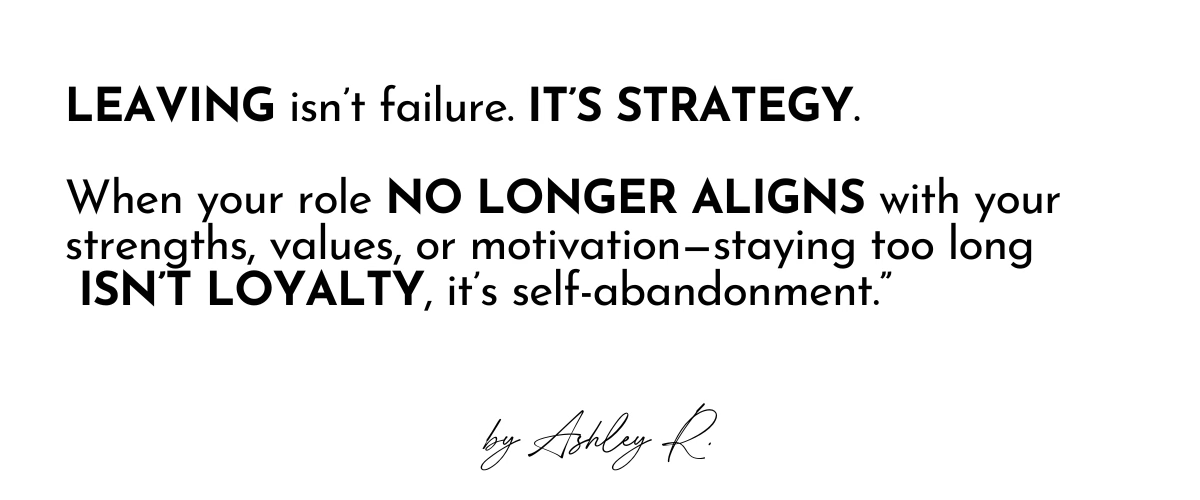Let's Talk About Knowing When It's Time to Quit
3 tell-tale signs for assessing whether you should stay or move on from your current role
Welcome to this week’s edition of Reframed by Ashley R. I write for high achieving professionals who rarely get the space to think through what they want next or how to lead in a way that actually works for them.
I'm Ashley Rudolph—a former tech executive turned coach for leaders and next-gen execs in the creative, tech, and lifestyle industries.
There’s a “word of the year” exercise going viral on social media. I hadn’t yet thought of my word until sitting down to write this very post. I’ve never chosen a word to define my upcoming year, but I have to admit I like the simplicity of it.
I’m deeming 2024 my year of opportunity.
I chose this word for a reason. It’s not just for myself, but for the work I do in supporting others to achieve their goals as well. I started embracing a spirit of openness towards opportunities late last year and haven’t looked back. If you know me, you know one of my services is coaching clients around identifying and securing their next opportunities via my job search coaching service. The new year presents an opportunity for us all to forge new paths, to continue improving on ourselves, and to leave the things that aren’t serving us behind. For some, that might mean exploring new professional opportunities.
This week, I was lucky enough to share my advice on this very topic with the NY Post in an article titled “New year blues? How to know when it’s time to quit your job”.
If you haven’t read the article, please do - it’s great!. While the article is full of useful nuggets, I wanted to take the time to share additional context and guidance on assessing when it’s time to go with all of you.
My most important takeaway is right at the end of the article:
“If your current role is misaligned with your strengths, motivators, or core values, if you don’t have a good relationship with your manager, or if your company is on a downward trajectory — these are all strong indicators that you should be planning your departure.”
To bring it back to where I started this post, we’re focused on growth and opening the door to new opportunities this year, so that requires being proactive. There’s no room to wait until you become disgruntled to examine the signs, not doing so could result in unnecessary damage to your professional relationships and reputation! No matter where you are in your journey, whether you’re happy, ambivalent (red flag!), or have one foot out the door — here’s a deep dive on my tips for knowing when it’s time to quit before it’s too late, as someone who has been in this boat personally and has coached clients, friends, and team members through this scenario.
Mondays feel hard
One thing I’ve learned is that you should pay attention to how you feel on Sunday nights/Monday mornings. We all get the Sunday Scaries from time to time, but here’s how to detect when your body is telling you that things aren’t quite right.
You have a meditation, relaxation, workout, etc. routine but you still dread starting your work week on Monday morning. If you’ve tried all of the recommended healthy coping mechanisms and you still feel drained and demotivated by your work - you should consider moving on.
Your work stress isn’t driven by a temporary challenge. You might feel a sense of dread when you’re being pushed outside of your comfort level. This is healthy. I’d characterize “good” stress (note: this is my personal opinion) as feeling nervous about a big presentation, taking on a new project, starting a new job, onboarding and training a new team member, working through a conflict with a peer (and you have identified or feel like you can identify) a resolution together, etc. This is the kind of work stress that has an end date. Sticking it out helps you grow and learn. Seeing it through will serve a purpose in your long-term career story; you will have developed new skills as a result. If your stress has no foreseeable end date — you should consider moving on.
WORK WITH ME
→ Ready for a smarter strategy behind your next move?
That’s why I created the Career Influence Index — a diagnostic quiz for high performers who want to uncover what’s next for them in their careers.
Work is a battleground
This one is important. High achievers and perfectionists, take a seat, slide in a little closer, and read carefully. Getting stuck on this particular hamster wheel is a waste of time for everyone involved. “Smart and accomplished” does not automatically equate to being well-suited for your current company’s existing strategy, team dynamics, and short and long-term goals.
An employment relationship is symbiotic. You should constantly be evaluating whether your skills are a match for what your company needs at any given point in time.
Think about it: Michael Jordan, the incredibly talented and iconic athlete that he is, was just not a great fit for baseball. No amount of training or effort could change that fact. You can also be incredibly talented and just not gel well within an organization and that’s okay. Your talents and skills won’t be a great fit for every company you join and that says nothing about you as an individual. Here’s one clear sign that work has become a battleground for you:
Executing on your core responsibilities feels hard. If you’re adept at collaboration and communication but find yourself constantly running into friction with your manager, peers, or your direct team members (if you’re a people manager), think about whether this pattern is sustainable long-term. Spoiler alert: it’s not. We’re at work to be productive, output matters. If you can’t make progress against your core daily, weekly, or monthly responsibilities, you’re not being productive. In this instance, I would encourage you to assess whether you can give notice and walk away in the short-term. If you can’t for whatever personal reasons, know that seeing the situation for what it is and dealing with it temporarily until you find your next gig is a sound and smart decision.
How to detect when your current role is misaligned with your strengths, motivators, or core values
Strengths: I’m not going to deep dive on strengths because I think this one is a bit more obvious than the other two. But let’s just run through two quick examples: (1) if you were hired for your analytical skills but your work has devolved into primarily project management work or (2) if you were hired for your team leadership skills and your role is now primarily focused on individual contributor work, you probably won’t be happy in either of these situations.
Motivators: Think about what motivates you in your professional life. When we talk about motivations, we mean the why behind the things we do. What drives you to do your work? What are the forces or influences that cause us to take action or do something? Here’s a few common motivators and what misalignment will look and feel like in your current role:
Are you someone who is motivated by financial rewards? Money is a common motivator for people and nothing is wrong with it. If you’re one of them and you’ve asked for a compensation increase and know that your company is not in a position to offer you one - you will likely experience frustration.
Are you someone who is motivated by recognition? Recognition looks like public or private acknowledgement of your efforts (your work, your outcomes, or your impact). If you crave recognition and you don’t receive it from your manager or even your peers - your first step is to communicate your need! But if after communicating it, you still don’t receive it — you will likely continue to experience frustration.
Are you someone who is mission-oriented? Do you find that you do your best work when it’s tied to an overarching mission that you’re inspired by? You could think about a mission in the traditional sense (ex. solving societal issues like education, poverty, access to healthcare, access to resources, etc) or as solving a problem that is interesting to you (ex. “You want to work for the best financial management app because you believe financial literacy is the key to building wealth”). If your current role isn’t attached to a mission that you can connect with — you’ll likely experience frustration.
Core Values: Your core values were likely shaped by your upbringing and life experiences. Core values are a set of fundamental beliefs and priorities that drive your behavior and influence your decisions. If you haven't yet identified your core values, here’s a list of 100+ core values that you can choose from. Here are some examples of ways that your work can compromise your core values:
One of your core values is accountability, but you work for an organization with low levels of accountability (missed deadlines are okay, metrics don’t matter, anything goes)
One of your core values is peace but your workplace has an argumentative or combative culture that impacts yourself or your team members directly. Or if one of your core values is peace but your company is engaged in an industry tied to conflict, combat, or warfare.
One of your core values is trust but your manager or skip level manager operates with a low level of trust, there’s a lack of transparency at the company, or if the company doesn’t deliver on their promises.
Some of these examples would be fairly inconsequential to individuals that don’t share the same strengths, motivators, or core values. One thing I’ve learned is it’s important to internalize these issues as your own and not think that because any of these may be true for you that they must present issues for everyone else.
Wishing you a 2024 full of opportunity! Whether it’s in your current role or, if you decide it’s time to move on, in your future role. GOOD LUCK!
See you next week.
Ashley
PS - if you’re still feeling unsure, take my Career Influence Quiz. It will help you diagnose why you feel stuck (or even unhappy) and what to do about it.
SUBSCRIBE
→ Already subscribed? You’re in good company.
My readers work at places like A24, DoorDash, IDEO, Disney, and Harvard — and they’re all here for the same reason: to lead with more clarity, confidence, and intention. If you’re not subscribed, click the subscribe button below.





